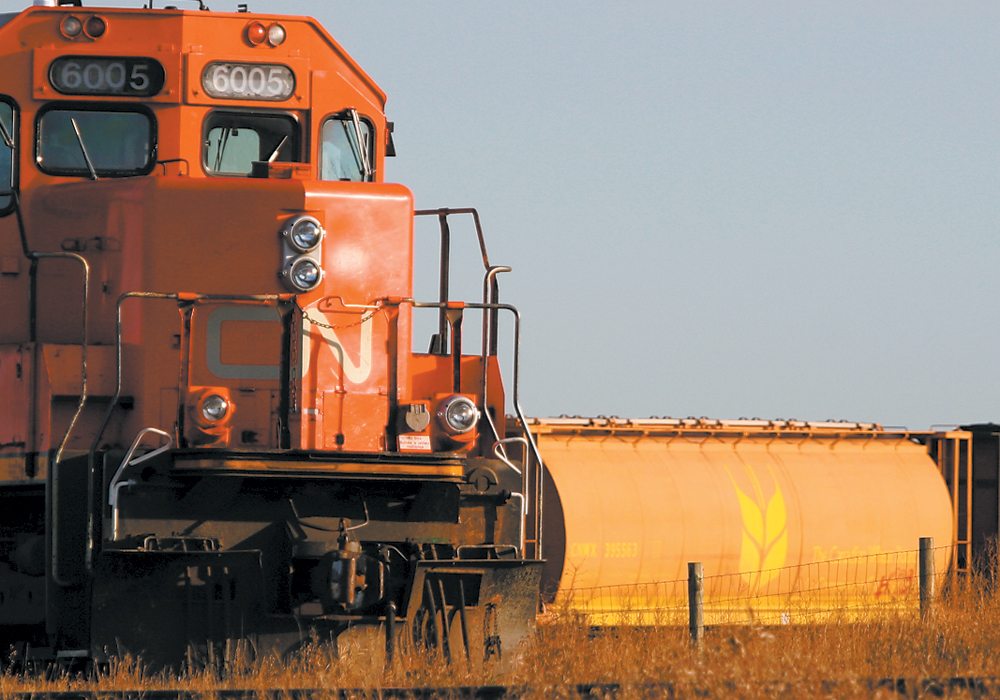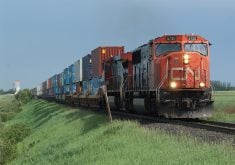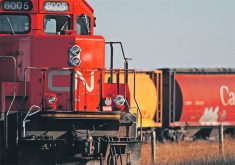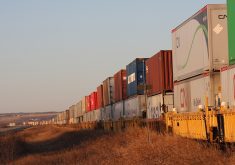Canadian National Railway is considering the purchase of 1,000 new grain hopper cars, but it is “contingent on the passage of Bill C-49 without amendments,” J.J. Ruest, the company’s interim president and chief executive officer, said during an April 24 conference call with investors.
CN’s existing grain hopper car fleet consists of about 12,000 cars, including leased units, customer-owned cars and hoppers owned by the railway.
CN declined to provide a numerical breakdown.
When asked why the purchase of new hopper cars was contingent on the passage of an unamended transportation bill, the company said, “Canada needs balanced regulation that encourages investment and innovation in the nation’s transportation system.
Read Also

Farming Smarter receives financial boost from Alberta government for potato research
Farming Smarter near Lethbridge got a boost to its research equipment, thanks to the Alberta government’s increase in funding for research associations.
“(This) is why we support the swift passage of C-49 without amendments … .
“Lack of stability in the regulatory environment puts at risk the extensive private investment in Canada’s trade-enabling freight network.”
The company declined to offer further information.
CN’s position on C-49 and its suggestion that hopper cars will not be purchased if the bill is amended is not sitting well with some prairie farm groups.
Officials with the Agricultural Producers Association of Saskatchewan said CN should be focused on improving service, not on influencing policy through contingent hopper car acquisitions.
“The rail car supply issue is a distraction from finding real solutions to fixing poor service,” said APAS president Todd Lewis.
“Cars are available. The shortage is in locomotives, labour and logistic planning.”
Lewis said acquiring new hopper cars may be part of a larger solution to improving rail service to the grain industry over the long term.
However, CN should be more concerned with addressing current service issues, including the backlog of prairie grain.
“We need to focus on the logistical planning for next crop year that will ensure we don’t have this problem again,” Lewis said.
Canadian potash company Nutrien said last week that it is planning to lay off more than 600 workers in Saskatchewan, citing poor rail service for forcing it to issue the layoffs earlier than normal. CN disputes the service claims.
Greg Northey, director of industry relations with Pulse Canada, said his organization was disappointed and surprised to learn that hopper car purchases at CN are now contingent on the passage of an unamended C-49.
“Their position is a bit disappointing, actually, because C-49 was specifically designed … to improve the investment climate for both railways … and the initial reaction to that was extremely positive,” Northey said.
“So, it was a bit of a surprise. We’ve had significant service issues this winter and both railways committed to invest in capacity and service when BillC-49 was still under discussion….
“It seemed like they were going to make these commitments in good faith regardless of C-49 because of the issues we were having.”
Meanwhile, Canadian farm groups have called for MPs to pass C-49 with the amendments proposed by Senate.
Last week, a coalition of farmer-directed agriculture groups including APAS, the Canadian Federation of Agriculture, the Alberta Federation of Agriculture and Keystone Agricultural Producers in Manitoba sent an open letter to members of Parliament urging that an amended bill be passed without delay.
Failure to adopt the Senate’s amendments would result in continued railway service delays, ongoing cash-flow concerns on western Canadian farms, and unnecessary risks to Canada’s reputation as a reliable international grain and oilseed supplier, the groups said.
“Farm groups feel the amended bill will help to stabilize our rail systems and provide the confidence needed to grow our international markets.”
The farm groups said proposed amendments give the Canadian Transportation Agency more authority to investigate and proactively seek solutions that can prevent grain transportation bottlenecks.
Access to interswitching would also provide grain companies with more competitive shipping options and could lead to efficiencies that benefit the entire supply chain, the farm groups said.
Ruest told investors that CN has seen significant improvements in network fluidity over the past few weeks.
Canadian grain volumes in the first quarter of 2018 were 10 percent lower than the same period last year, he said.
Ruest said the company averaged 5,700 hopper car placements per week in March, up 40 percent from February.
“In the last seven weeks, we made quite significant progress and we are now running current with weekly car orders as placed on us by grain companies,” Ruest said.


















